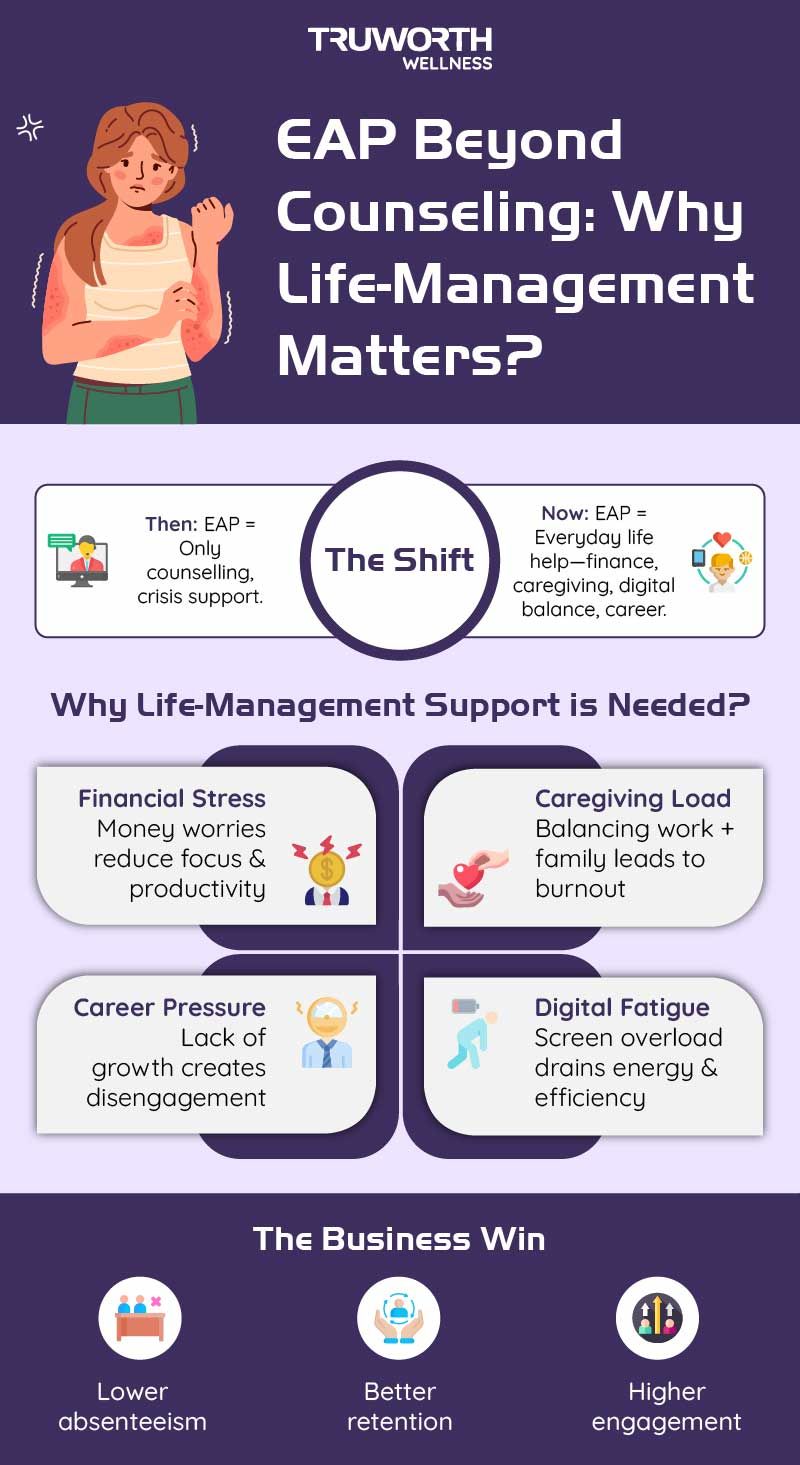EAP Beyond Counseling: Why Modern Employees Need Life-Management Support?

For years, Employee Assistance Programs (EAPs) have been synonymous with counseling. Whenever someone mentioned an EAP, the immediate association was access to confidential sessions for stress, anxiety, or depression. While counseling remains a critical element, the nature of work and life has changed dramatically. Today’s employees are navigating challenges that extend well beyond mental health—financial instability, caregiving demands, digital fatigue, and constant career pressures.
This shift has pushed organizations to rethink the role of EAPs. The modern workforce no longer needs an EAP that only steps in during a crisis. They need a system that supports them in the everyday realities of life—a holistic life-management partner.

Why Counseling Alone Isn’t Enough Anymore?
Traditional EAPs were designed in an era when the workplace was more structured, roles were clearly defined, and support systems outside of work were stronger. But now, boundaries between professional and personal life are blurred. A working parent might be joining a client call while also helping a child with homework. An employee may be trying to focus on a project while worrying about a parent’s health or an unexpected loan payment.
In such scenarios, stress does not always manifest as a clinical condition requiring therapy. It often shows up as distraction, fatigue, or disengagement—issues that don’t always warrant counseling but still reduce productivity and morale. This is where life-management support becomes vital.
The Expanding Role of EAPs
A modern EAP is not just a hotline number employees dial during breakdowns. It’s a comprehensive ecosystem that provides preventive, practical, and personalized assistance. By addressing real-world concerns, life-management support makes EAPs relevant to the everyday employee—not just those in crisis.
Here’s how EAPs are evolving beyond traditional counseling:
1. Financial Wellness Support
Money worries are one of the biggest hidden stressors at work. Whether it’s planning for retirement, managing debt, or simply learning better budgeting practices, financial concerns spill over into performance. An EAP that offers financial literacy programs, expert consultations, or tools for smarter money management helps employees regain a sense of control and security.
2. Work-Life Integration Assistance
Modern employees often wear multiple hats—professional, caregiver, parent, child, and more. Juggling these roles without adequate support leads to exhaustion. EAPs can bridge this gap by offering access to caregiving resources, legal guidance, and even concierge services that save employees time and mental energy. For example, an employee managing eldercare responsibilities could benefit from information on specialized healthcare providers through their EAP.
3. Managing Digital Overload
With hybrid and remote work models, many employees are tethered to their screens for over 10 hours a day. The constant stream of emails, pings, and video calls creates “digital fatigue.” Progressive EAPs now incorporate workshops on digital detox strategies, mindfulness practices, and time-blocking techniques to help employees reset their focus and energy.
4. Career and Growth Coaching
Sometimes stress arises not from external pressures but from within the workplace itself—career stagnation, skill gaps, or lack of clarity about future growth. Life-management-oriented EAPs now include career coaching, mentoring programs, and access to learning platforms. This not only reduces frustration but also makes employees feel invested in, which directly boosts retention.
5. Support for Everyday Challenges
Not all stressors are dramatic. Some are as basic as relocating to a new city, finding reliable childcare, or navigating paperwork for a housing loan. While these may seem “personal,” they directly influence how focused and present an employee can be at work. EAPs that provide practical guidance in these areas function like a personal assistant, easing burdens that would otherwise pile up.
The Business Case for Life-Management Support
Investing in EAPs that go beyond counseling isn’t just about compassion—it’s smart business. Employees who feel supported holistically are more engaged, productive, and loyal. Here’s why organizations are making the shift:
- Lower Absenteeism: When employees get proactive help with life challenges, they’re less likely to take unplanned time off.
- Better Retention: Knowing their employer values them as whole people encourages employees to stay longer.
- Higher Engagement: Employees with fewer personal distractions can contribute more energy and creativity to their roles.
- Stronger Employer Brand: Offering robust EAPs signals that a company genuinely cares, attracting top talent in competitive markets.
Ultimately, the ROI is clear: reducing stress and distractions outside of work directly translates into higher performance inside of work.
Moving Towards Holistic Wellbeing
The future of EAPs lies in integration and personalization. Counseling will remain essential, but it’s just one piece of a much bigger puzzle. By combining emotional, financial, career, and lifestyle support, EAPs can transform from being reactive tools into proactive partners in employee wellbeing.
Organizations that make this shift are not only addressing the wellness of their workforce—they’re building a culture of care, resilience, and trust.
Final Word
Employees don’t leave their personal struggles behind when they log into work. Stressors, both big and small, follow them throughout the day. By reimagining EAPs as life-management programs, companies acknowledge a simple truth: employees are not just job titles, they are whole human beings with layered lives.
When organizations step up to provide that support, the payoff is mutual—healthier, happier employees and stronger, more resilient businesses.
How Truworth Wellness Can Help?
At Truworth Wellness, we design EAPs that go far beyond traditional counseling. Our solutions integrate financial coaching, caregiving resources, career support, and lifestyle assistance—helping employees manage the real-world challenges that impact their wellbeing. With 24/7 access, personalized resources, and proactive programs, we empower your workforce to thrive not just at work, but in life.
Because supporting employees holistically isn’t just good HR—it’s the future of work.